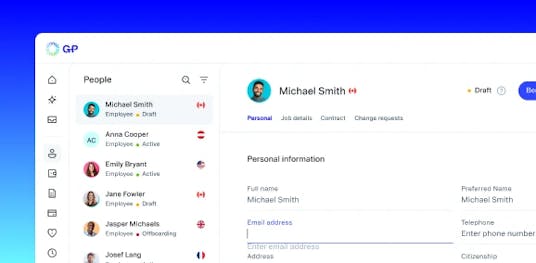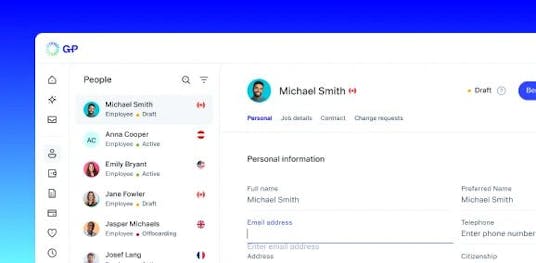Navigating the Czech Republic’s complex labor market is a significant challenge for businesses seeking to expand while remaining compliant with local laws. An employer of record (EOR) provides a streamlined solution, enabling you to hire employees in the Czech Republic without establishing a local legal entity. Using SaaS EOR services can significantly simplify the hiring process by providing comprehensive support for business expansion. An EOR acts as the legal employer, managing payroll, benefits, taxes, and HR compliance while you direct your employee's day-to-day work.
As a global EOR expert, G-P manages payroll, employment contract best practices, statutory and market norm benefits, and other administrative services. You'll have peace of mind knowing your Czech Republic hiring and employment is handled by a team of dedicated experts. G-P provides the resources companies need to quickly hire global talent in 180+ countries.
Hiring in the Czech Republic with an EOR
The Czech Republic, a Central European country bordered by Germany, Austria, Slovakia, and Poland, offers a highly skilled workforce and a strategic location. However, its labor laws include specific requirements for contracts, working hours, and benefits that can be complex to navigate. Partnering with an EOR in the Czech Republic allows companies to hire employees and manage payroll and benefits while ensuring compliance with the Czech Labour Code, without establishing a local legal entity.
Simplify hiring in the Czech Republic with an employer of record
Hiring in the Czech Republic can be complex due to specific labor laws and administrative requirements. An employer of record provides a streamlined solution, allowing companies to quickly and compliantly hire employees without establishing a local entity. By partnering with an EOR, businesses can navigate the intricacies of the Czech employment landscape with ease.
-
Legal compliance: An EOR ensures adherence to the Czech Labour Code, handling all legal requirements for employment contracts, working hours, and benefits.
-
No local entity required: You can hire employees in the Czech Republic without the need to establish your own local legal entity, significantly reducing setup time and costs.
-
Payroll and benefits management: The EOR manages the responsibility for managing payroll, tax withholdings, and administering statutory and market norm benefits, simplifying your administrative burden.
-
HR administration: From onboarding to termination, an EOR manages essential HR functions, allowing you to focus on your core business operations.
-
Expert guidance: Benefit from a team of dedicated local experts who are knowledgeable about Czech labor laws and employment practices.
Employment contracts in the Czech Republic
It is a legal requirement to establish a written employment contract with every employee. While the default is an indefinite contract, fixed-term contracts are permissible but must adhere to strict rules: they may not exceed a duration of 3 years and can only be renewed a maximum of two times with the same employer.
An EOR ensures that all employment contracts meet local requirements. A compliant contract must, at a minimum, specify the type of work, place of work, and start date. Details such as compensation, notice periods, and vacation entitlement must be provided in writing within one month of employment. An offer letter and employment contract should always state the salary and any compensation amounts in Czech koruna (CZK). An EOR ensures that all contracts meet these local requirements.
Working Hours in the Czech Republic
The standard workweek is 40 hours. Overtime is permitted only for serious operational reasons and must be pre-approved. An employer can mandate up to 150 hours of overtime per year. Additional overtime, up to an average of 8 hours per week over a 26-week period (extendable to 52 weeks via a collective agreement), is possible with the employee's consent.
An EOR in the Czech Republic assists companies in managing working hour compliance by ensuring adherence to the Czech Labour Code for public holidays, vacation days, sick leave, and parental leave. The EOR handles the complexities of statutory entitlements, such as ensuring employees receive paid time off for the country's 13 public holidays, administering the legally mandated 4 weeks of paid annual leave (often 5 weeks by market practice), and managing the processes for sick leave compensation and the various forms of maternity, paternity, and parental leave. By acting as the legal employer, the EOR accurately calculates and processes these entitlements, reducing the administrative burden on businesses and managing compliance with local labor regulations without the need for a local entity.
Public Holidays in the Czech Republic
Employees are entitled to a paid day off for the country's 13 public holidays:
-
New Year's Day (January 1)
-
Good Friday
-
Easter Monday
-
Labour Day (May 1)
-
Liberation Day (May 8)
-
Saints Cyril and Methodius Day (July 5)
-
Jan Hus Day (July 6)
-
St. Wenceslas Day (Czech Statehood Day, September 28)
-
Independent Czechoslovak State Day (October 28)
-
Struggle for Freedom and Democracy Day (November 17)
-
Christmas Eve (December 24)
-
Christmas Day (December 25)
-
Second Day of Christmas (St. Stephen's Day, December 26)
Holidays falling on a weekend are not moved to a weekday.
Vacation and leave in the Czech Republic
Employees are entitled to a statutory minimum of 4 weeks of paid vacation per year, calculated on an hourly basis. It is common market practice to offer 5 weeks of vacation.
Sick leave in Czech Republic
In case of illness, the employer provides salary compensation for the first 14 calendar days at a rate of 60% of the employee's reduced average earnings. From the 15th day, the Czech Social Security Administration provides sickness benefits for up to 380 days. The benefit rate increases over time:
-
Days 15–30: 60% of the daily assessment base
-
Days 31–60: 66% of the daily assessment base
-
From day 61: 72% of the daily assessment base
Maternity, paternity, and parental leave in Czech Republic
-
Maternity leave in Czech Republic: Pregnant employees are entitled to 28 weeks of leave (37 weeks for multiple births), which can begin 6 to 8 weeks before the due date. The Social Security Administration pays a maternity benefit of 70% of the employee's assessment base.
-
Paternity leave in Czech Republic: Fathers are entitled to 14 calendar days of paid paternity leave, which must be taken within 6 weeks of the child's birth. The benefit is 70% of the assessment base.
-
Parental leave in Czech Republic: After maternity leave, either parent can take job-protected parental leave until the child reaches 3 years of age. A parental allowance is paid by the state during this period. As of 2025, the total allowance is CZK 350,000 per child (CZK 525,000 for multiples).
-
Care leave in Czech Republic: Employees may take up to 9 days of leave (16 for single parents) to care for a sick child under 10 or another sick family member.
Health insurance and supplementary benefits in Czech Republic
The Czech Republic has a mandatory state health insurance system. Contributions total 13.5% of an employee's gross salary, split between the employer (9%) and the employee (4.5%). There is no income cap for health insurance contributions. While the public system is of high quality, providing supplementary private health insurance is a common employee benefit.
Other common benefits include meal vouchers or a tax-advantaged cash meal allowance (strašovací paušál).
An employer of record assists businesses in the Czech Republic with health insurance by managing the mandatory state health insurance system. This includes accurately calculating and processing contributions, which total 13.5% of an employee's gross salary, split between the employer (9%) and the employee (4.5%). The EOR ensures full compliance with these regulations, reducing the administrative burden on businesses. While the public system is high quality, an EOR can also help facilitate supplementary private health insurance, which is a common employee benefit, without the need for the company to establish a local legal entity.
Termination and severance in the Czech Republic
A probationary period may be agreed upon in the employment contract, up to a maximum of 3 months for most employees and 6 months for managers. The statutory notice period for termination is 2 months for both the employer and employee and cannot be shortened by mutual agreement, though it can be extended.
If an employee is terminated for organizational reasons (e.g., redundancy), they are entitled to statutory severance pay based on their length of service:
-
1x average monthly earnings for employment less than 1 year
-
2x average monthly earnings for employment between 1 and 2 years
-
3x average monthly earnings for employment of 2 years or more
Taxes and social security in the Czech Republic
As of 2025, personal income is taxed at two progressive rates:
-
15% on annual income up to CZK 1,663,200 (36 times the average wage).
-
23% on annual income exceeding this threshold.
Social security contributions are mandatory for both employers and employees. The employer's contribution is 24.8% of the employee's gross salary, and the employee contributes 7.1%. These contributions are capped at an annual income of CZK 2,217,600 (48 times the average wage for 2025).
Choosing the right EOR in Czech Republic
When selecting an employer of record in the Czech Republic, consider the following key factors to ensure a compliant and efficient global expansion:
-
Compliance expertise: The EOR should possess in-depth knowledge of Czech labor laws, including the Labor Code (Act No. 262/2006 Coll.), collective agreements, and local tax regulations. This ensures that all employment practices, from contracts to termination, are compliant.
-
Comprehensive service offering: A robust EOR partner should manage all aspects of employment, including payroll processing, tax remittances, benefits administration, leave management, and offboarding procedures.
-
Local market understanding: Look for an EOR with a strong local presence or proven experience in the Czech Republic, as this often indicates a better understanding of market norms and cultural nuances that can impact employee relations.
-
Scalability and flexibility: The EOR should be able to accommodate your hiring needs, whether you'rehiring a single employee or a global team, and adapt to potential changes in your global expansion strategy.
-
Technology and integration: A modern, AI-powered platform that simplifies onboarding, management, and payment of employees, and integrates with existing HCM, PEO, or payroll systems, can significantly streamline operations.
-
Transparency and communication: Choose an EOR that offers clear communication channels, transparent pricing, and regular updates on compliance changes.
-
Reputation and references: Research the EOR's reputation,client testimonials, and industry recognition to ensure they have a track record of reliability and success.
-
Data security and compliance. Ensure your EOR follows strictdata security protocols like GDPR. This is critical for protecting sensitive employee information and maintaining compliance.
Why G-P EOR for global hiring in the Czech Republic?
G-P EOR is the recognized leader in global employment, ranked No. 1 in every industry analyst report. G-P’s global employment platform delivers everything companies of all sizes need to manage the full employee lifecycle with its trusted Global HR Agent, G-P Gia, and AI-powered Employer of Record (EOR) and Contractor products. G-P supports teams in 180+ countries with more than a decade of global employment experience, the largest team of in-country HR, legal, and compliance experts, and its unmatched proprietary knowledge base.
G-P is also thepreferred partner for leading HCM, PEO, and payroll platforms. Bring your workforce data together in one place to maintain existing workflows while guaranteeing consistent and accurate data across your integrated systems.
Request a proposal today to start hiring in the Czech Republic today.




















